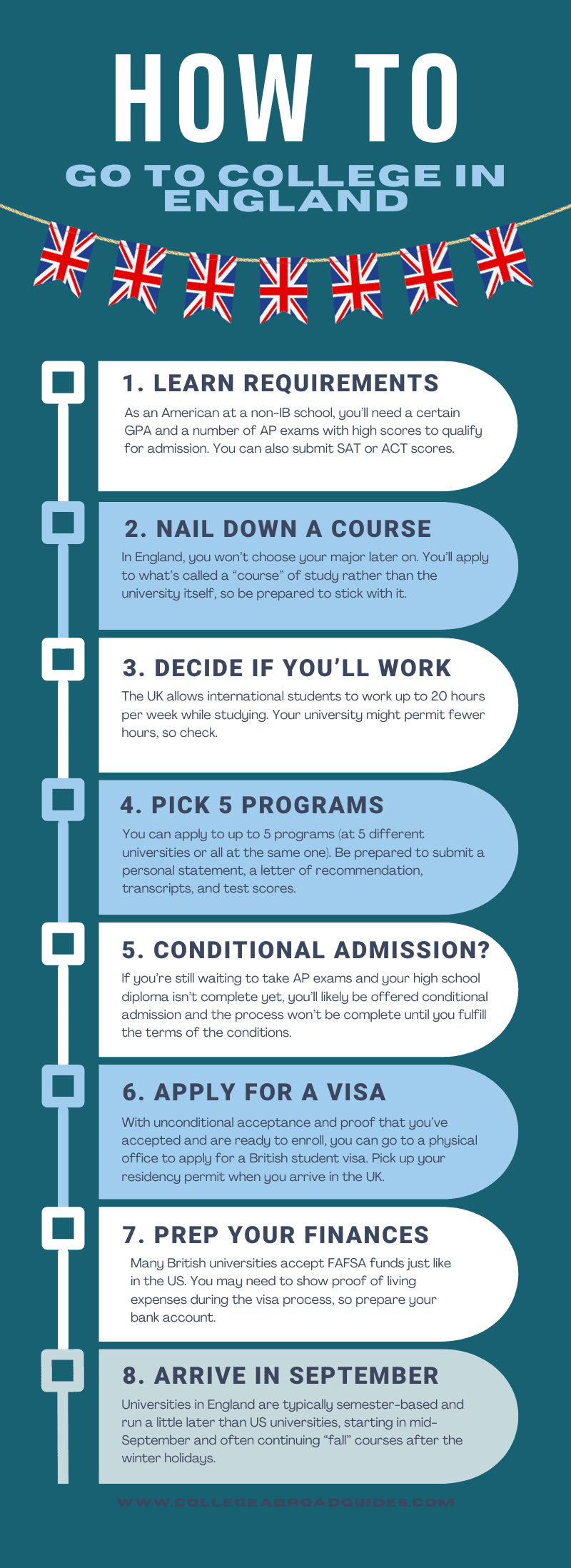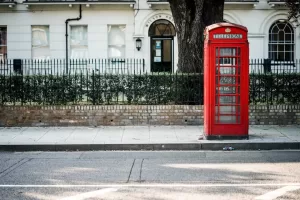
Go to College in England: The Ultimate Beginner’s Guide

- Originally published
- Last updated on September 4th, 2024 at 02:42 pm
Table of Contents
Are you Thinking About Going to College in England?
They say England and the U.S. are two nations separated by a common language.
That makes the land of Churchill and Queen Elizabeth an appealing place for Americans who might feel more confident they understand this “foreign” culture.
It’s true: you’ll find a lot of fun-house-mirror commonalities and differences between these two “special friends” if you go to college in England.
What’s Scotland Like? (Spoiler: it’s really different!) Learn the basics here.
Want to see a cost comparison? Check out the cheapest universities in the UK (you’ll find England can be cheaper than Scotland, even in pricy London).
London calling? We break down the best university in London, for every type of student.
A similar culture is one of many huge advantages to going to college in England for an undergrad degree: foremost, every degree British universities offer is already taught in English. Further, every available job for new graduates is in English.
Are you thinking of going to college in England because you want to live in England?
In December 2023, anti-migration sentiment in the UK prompted proposals to “review” the graduate visa and raise the skilled worker visa minimum income requirements to a (very high for new grads in the UK economy) level of £38,700.
The left-wing Labour Party’s election win in July 2024 has quelled fears of changes (for now). But uncertainties remain.
There are some obvious differences in higher education in England:
-
Study programs are 3 years long.
-
There are no general education classes as part of an undergraduate degree.
-
Students specialize right away. You’ll apply to your department, not to the university. It’s not possible to “change your major.”
-
You won’t get a lot of choices in your education. You’ll take the courses that a department offers for your degree. There are a few optional courses. Many departments pre-plan your route for all three years with just a handful of electives.
-
With a huge emphasis on degree coursework, studying abroad is a little harder. You might find study abroad programs are limited by your discipline and particular locations.
Despite the differences, England is a popular destination that’s only getting more popular. Since Brexit, the UK has seen 50,000 more American students than before. Perhaps increased fees for EU students have helped the surge (after all, they used to pay in-country tuition).
Today, Americans bring in premium tuition dollars. It’s in the interest of colleges to make ways to recognize American high school credentials and admit qualified students. And they do.
Even pre-Brexit, Britain was the #1 destination for American students pursuing a degree abroad, with 21,000 students going to college in the UK.
They’ll get access to some of the best universities in the world. Number one ranked Oxford and #3 Cambridge have international reputations. Students shouldn’t discount the prestigious #10 Imperial College London or #22 University College London.
Overall, going to college in England is a great choice for students who know what they want to study and are ready to dive in.
Can I go to college in England?
Yes, non-EU students are welcome to apply. However, they’ll pay international tuition and fees to go to college in the UK. That’s not a deal-breaker for many American students who see England’s 3-year degree program as a built-in discount.
Studying in England is not harder for U.S. students post-Brexit. Non-EU students, like always, will get an unconditional acceptance offer, then apply for a student visa. Many even accomplish this task between July, when their final AP scores are posted, and September when the fall term starts, which can feel scary, but is doable.
Here’s what your roadmap will look like:

Because England and the US have different high school systems, you may find the British qualifications confusing. Luckily, there are international requirements listed for university degrees, broken down by country of origin.
Find the international qualifications and choose “United States” for a list of required tests, grades, and scores at a particular school. Most schools have a number of AP tests at a certain level and SAT/ACT scores to help support applications, too. These international qualifications let British schools understand American credentials.
AP test scores are desirable stand-ins for British A-levels. Remember: this means final test scores are important, not just taking AP-level courses and earning high grades.
Homeschoolers: British admissions counselors see plenty of homeschool transcripts. The process is simple for American homeschooled students, who rely on test scores to tell their academic story.
Because British universities prioritize test scores and experience (even reading books) in your field, not grades, extracurriculars, leadership, or overcoming obstacles, homeschoolers might be said to have it “easy.”
One homeschooler told us, “I was lucky that I had more time than a traditional student to study for my AP exams, since the grades in those classes seemed incidental in England, but the final score on the test was the important thing to my preferred schools.”
What universities should I consider?
We focus on 61 UK universities that are Times-ranked >1,999 and that accept international students. That doesn’t include lots of arts and specialty universities.
Aston University (Review)
Birkbeck, University of London (Review)
Birmingham City University (Review)
Bournemouth University (Review)
Brunel University London (Review)
Cambridge University (Review)
Canterbury Christ Church University (Review)
City, University of London (Review)
De Montfort University (Review)
Durham University (Review)
Goldsmiths, University of London (Review)
Imperial College London (Review)
Keele University (Review)
Lancaster University (Review)
Liverpool John Moores University (Review)
London School of Economics and Political Science (Review)
London South Bank University (Review)
Loughborough University (Review)
Manchester Metropolitan University (Review)
Middlesex University (Review)
Newcastle University (Review)
Northumbria University (Review)
Nottingham Trent University (Review)
Queen Mary University of London (Review)
Royal Holloway University of London (Review)
Royal Veterinary College (Review)
SOAS University of London (Review)
Sheffield Hallam University (Review)
Staffordshire University (Review)
University College London (Review)
University of Bath (Review)
University of Bedfordshire (Review)
University of Birmingham (Review)
University of Bradford (Review)
University of Brighton (Review)
University of Bristol (Review)
University of East Anglia (Review)
University of East London (Review)
University of Essex (Review)
University of Greenwich (Review)
University of Hertfordshire (Review)
University of Huddersfield (Review)
University of Hull (Review)
University of Kent (Review)
University of Leicester (Review)
University of Lincoln (Review)
University of Liverpool (Review)
University of Nottingham (Review)
University of Oxford (Review)
University of Plymouth (Review)
University of Reading (Review)
University of Roehampton (Review)
University of Salford (Review)
University of Sheffield (Review)
University of Southampton (Review)
University of Sunderland (Review)
University of Surrey (Review)
University of Sussex (Review)
University of Warwick (Review)
University of Westminster (Review)
University of York (Review)
Can I transfer to a university in England?
There are rare opportunities for freshmen to transfer to universities in the UK (mostly Scotland, not England) after a year, taking some credit with them. This is not the norm. English universities are three years long and focus on a disciplinary area. American students looking to bail after a year in the U.S. will find they have few equivalent classes. They’re likely going to be starting as first-year students.
Even later in their college careers, the two systems don’t overlap much. Students who regret their decision to stay in the U.S. should consider studying abroad. that way, they won’t lose credits earned in the U.S. Later, they can apply for a master’s program in the UK.
Is England good for international students?
Yes.
England is consistently one of the top destinations for students from all over the world to complete a degree abroad. Some reasons include:
- The sun never set on the British empire. Nowadays, many countries have a cultural connection (and speak English). Their students often find England an appealing option for college.
- It has some of the best universities in the world. You can study at ancient universities, such as Oxford or Cambridge, hubs of British research.
- There are overseas programs and locations from US colleges, like Northeastern’s London double-degree.
- An increasing number of joint degrees (like a double or combined major such as “Archaeology and Ancient History”) help appeal to students who aren’t 100% ready to commit to a single program.
After graduation, England allows its grads to stay for up to 2 years on a Graduate Route visa. They can complete an internship, work, or look for a job (and Ph.D. students can stay up to three years). That gives students time to explore options, work temporarily, and position themselves in the British job market.
And for many students, England has economic advantages that may be part of their decision to study there. London, for instance, is a global finance center and a hub for museum professionals, artists, and marketers.
The cost of a degree is a big drawback to England (London is one of the world’s most expensive cities).
Students should also consider the differences in educational norms.
- In England, university students find high-stakes testing and a single large paper more normal than in the U.S., where coursework includes multiple assignments throughout the semester.
- Students in the U.K. expect low grades, making it hard to transition back and forth between U.S. and British systems for undergraduate and graduate study. British students often say their best papers are lauded with no mistakes, and then given a soul-crushing 70% score.
What other challenges do students often discuss?
- Diversity can be a major obstacle for international students outside major cities.
- Finding work during the course of your degree program can also be daunting.
Students report that the British melting pot doesn’t melt quite like America’s. They worry about British classism and racism, though these emerge in different ways than in the US. Students also report that anti-Americanism, in the form of fellow students’ snide comments, gets grating.
My classmates love to mention school shootings at every opportunity. I've even had professors bring it up in comparisons to ancient civilizations, and it feels like it's just there because they can engage students better by making fun of the U.S.
Can international students work in England?
Yes.
Students using a visa to study in England can work in the UK up to 20 hours per week, from Monday to Sunday, during the school term. That includes paid and unpaid work, and it may also include more hours than your university permits. Be sure to check.
There are job fairs each fall on my campus, and there are lots of big, local employers who are happy to have students and can employ American students through the year and over the summer...but I haven't seen international friends who have graduated have the same experience getting a career-oriented job easily.
Students say that in tough economic times, like 2023, there are fewer options to find work. Additionally, employers don’t always realize they do not need to sponsor international students for work. Many students find work in pubs is the simplest work to find as international students.
Students can work full-time in the UK during vacation periods.
Prohibited activities on a UK student visa include running any self-employed businesses you may have been running back home and continue to profit from (like selling digital products, stickers, commissions, or Etsy gear). There are also prohibitions on jobs like yoga instructor, dj, and professional soccer player, so read up on the student visa rules (and fees) to determine how you’ll be able to fit your work life into your studies in England.
Finally, you’ll have to show you already have funds to support yourself for a year in England (and show even more money, around $15,000, if you’re going to college in London). So be prepared to have savings before touching down in the UK for college.
I have actually found London to be incredibly affordable compared to California. You are paying 20% "sales tax" instead of 10 if you think about the conversion rate. Even so, you are still paying less for clothes and groceries than you would in a big city in the US. Going out to a movie or a pub, on the other hand, is about the same price.
How many universities can you apply to in England?
The online Universities and Colleges Admissions Centre (UCAS) system allows students to pick five total programs (remember: this is programs, not schools!) in the UK. That includes England, but also Scotland, Wales, and Northern Ireland. You can stick to England or branch out among programs, but remember they aren’t all the same as England. Undergraduate degrees in Scotland, for instance, are typically 4-year programs.
UCAS, the UK’s version of “common app”, will allow you to choose 5 different programs at a single university, or 5 programs at 5 different universities. You’ll upload transcripts, test scores, letters of recommendation, and your personal essay once.
This is a general rule for undergraduate studies. UCAS limits applicants to four programs in veterinary science, medicine, and dentistry.
UCAS was really frustrating. The idea of a common app is great but I found some things were visible to some of my schools but not others. In the end, I did a lot of individual emailing with schools which they seemed to think was normal. They were happy to hear from me and offer me a position even without having some information visible to them in UCAS. It was stressful.
How many universities are in England?
There are 106 universities in England (of the 163 UK universities ranked by the Times World University rankings).
And maybe that’s a core reason why the UK attracts so many American students—instead of a dozen (at most) options in small and non-English speaking countries, students looking into England have many choices. England has large and small schools, schools in urban and rural environments, and schools that specialize in every discipline imaginable. Here are a few differences between the types of schools in the UK.
Let’s see them on a map and talk about the different “types” of universities:
Types of Colleges in England
Ancient Universities
Ancient universities don’t predate written history, but they are pretty old—all predate 1600. England has two: Oxford, which was founded in 1096 and is the oldest institution of higher learning in the English-speaking world, and Cambridge, founded in 1209 by some dissenters after Oxford scholars were executed (I don’t blame them. This seems like a good reason to form an alternative!)
Civic Universities
These public universities had a different founding principle than ancient universities: they aimed to provide practical education in science and engineering to students regardless of religion or background. Less focused on tutorials and more on serving the industrial cities where they emerged, they’ve grown into large research institutions in metropolitan areas, and are appealing to international students. They include the Universities of Birmingham, Sheffield, Bristol, Leeds, Liverpool, and Manchester.
1960s “Plate Glass” Universities
These newcomers offer up groovy architecture and more experimental syllabi. Today, they include a number of large research institutions, and their purposeful construction means they offer a more American campus feel than the city-center Civic Universities. Campuses include the Universities of Essex, Kent, Sussex, Warwick, York, and East Anglia.
The Russell Group
Made up of 24 British schools that emphasize research, they include universities in other groups, like Cambridge and the University of Birmingham. They also include prestigious spots like the University of Durham. Together, the group take the liion’s share of research dough in the UK, and are particularly appealing to students looking for a degree abroad that’s recognized back home.
How much is college in England?
College in England runs roughly $20,000 to $30,000 annually, plus room and board. Rooms can be difficult, as students pay extra to stay over breaks (and they may not even have the option!). Students pay in British pounds, so it helps to be aware of ongoing exchange rate advantages.
Scotland can be affordable, even for international students paying tuition, compared to the U.S. Rough annual tuition runs $14,000 – $24,000 (you’ll pay in pounds, so watch the exchange rates).
Students will also pay roughly $200 for their visa, $450 for NHS health insurance required of students, and ongoing travel, storage, and transportation costs.
English students also pay for college. Since 1998, college has not been free for residents of the U.K. The average British student now graduates with around $56,000 in debt.
Nevertheless, home students have tuition capped at £9,250 per year, and are granted “maintenance” loans to cover living expenses.
“Fee status” has a lot to do with paying the international fee. If you think you qualify as a resident of England, you’ll be entitled to lower tuition fees. While this is theoretically a national status, some universities make their own calls, with some students report that they did or did not attend a particular university based on getting the designation at some of their top choices but not others.
The cost of living is high in England. In 2022, a single person can expect to need $912 plus rent to make it through the month. That’s 14% lower than in the U.S., but students in London should be careful not to be too hopeful about this comparison. The entire country is enduring a cost of living crisis, and inflation is making everything from energy to groceries untenable for many Brits themselves.
Some scholarships are available for international students independently and after admission, though many offer an incentive for first-year students only.
Is university free in England?
No. Home residents find their tuition is capped at around $11,500 per year. That’s still incredibly high. Loans are available for residents to support their room and board while completing a degree. But today, many Brits find themselves in debt for undergraduate degrees.
Can I use financial aid to go to college in England?
Probably! Almost all of the big-name schools in England accept the U.S. FAFSA form and allow U.S. student aid. There are no special requirements to use your aid abroad if your school is on the list. Just apply for aid like you would at a U.S. school.
Be sure to check the list for parent schools if you don’t see your choice. For example, the FAFSA spreadsheet lists Royal Holloway under “University of London.”
When does university start in England?
English universities typically run on semesters but start late compared to many US schools (mid-September). Students move into dorms in the middle of September. Exam week is not over until days before Christmas (that could make flights home more expensive, too).
Spring semester looks more familiar to American students, with classes from mid-January until late May (the semesters seem to start a couple of days earlier than in the US rather than waiting out the MLK Jr. holiday). Remember, that means you won’t have as long a break as a typical American university over the winter holidays.
In the UK, a third “term” refers to summer classes.
In the UK, many universities have “reading weeks” midway through the term to allow students to catch up.
How to apply to colleges in England
The application process starts by registering with the UK’s common portal: the Universities and Colleges Admissions Centre (UCAS). You can apply to five programs at once, but there are fees that increase with the number of programs you apply to. International students, EU students, and British students all use this portal. You’ll be allowed to apply to up to five courses in the UK with this system (that includes England, Scotland, Wales, and Northern Ireland schools).
Make sure you check out the programs you are interested in and include your qualifications on your UCAS application — there will be an international page detailing what American students should have accomplished in high school in order to qualify for admission.
Upload grades, AP coursework, test scores, letters of recommendation, and a personal statement that covers all your programs (this part can be tricky if you’re applying for a few different programs).
Preparing for college means researching what you’ll need to achieve in order to go to college in England.
Overall, going to college in England is a great way to experience the culture of another country. You’ll get real-life international experience in a vibrant, international environment. You’ll also get to side-step some of the expensive foundational courses your peers back in the states are paying for.
Check out our guidebooks for detailed descriptions of English-taught programs in Europe, geared toward American students, with interviews from students that go beyond facts and figures, giving you details that can help you find if going to college in England is the right move for you.
School Guides in England
Articles about College in the UK
Reviews of Universities in England and the UK (including Scotland)
Related Posts

Jessica Share
Jessica is the writer, Ph.D., and mom-of-an-abroad-student-in-the-UK at the helm of College Abroad Guides. When she's not asking college students where the coolest place to hang out in their city is, she's figuring out how she can make $60 imported Greek oregano potato chips and £50 British bacon potato chips appear on her doorstep for the cost of a local bag of Lay's.



































































































